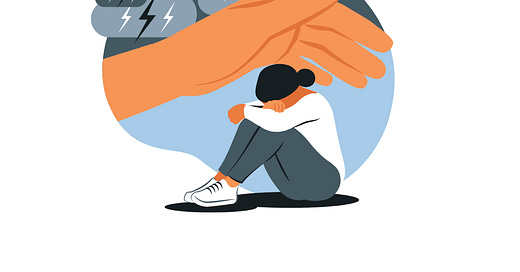Loss is an inevitable part of life. We know that life eventually comes to an end, and when that time comes, it will be sad and trying. But even with all this understanding of death, it still has unspeakable capacity to change us. It changes the way we view the world, the way we view the people in our lives, and the way we view ourselves.
A huge focus for me as a therapist who works with couples is exploring what it means to turn toward each other rather than away from each other. The reality is: it’s really hard to turn toward someone after experiencing loss. There is so much unknown and so much fear of the future, it feels impossible to ask someone to help guide us through this time when we’re not even sure what to ask for.
On top of the fear of the unknown, I want to add something else here that touches on the relational component of grief: there is a very prevalent theme of worrying you’re going to bring your partner down because of your trauma and your sadness.
I don’t want to diminish this because I don’t believe that is an irrational thought to have. But I do want to offer some professional and personal perspective.
Two months to the day after my wedding, my dad died by suicide. To say that my world came to a violent, screeching halt feels insufficient. I spent the following months vacillating between depression or crippling anxiety, and those were two conditions with which I never had experience prior to losing my dad. I concentrated a lot of time and energy figuring out ways to shut my husband out. Some were subtle, some were not-so-subtle, like when I told him that I needed him to divorce me (more than once) so that he could start a new, happy life with someone else. Yikes, right?
I was so preoccupied with how my husband was experiencing me that I left no room for 2 important things:
The opportunity for him to support me
The opportunity for him to share what the experience was like for him.
Now, let me clarify what I mean by letting him share his experience. I don’t mean that I needed to make myself or my feelings smaller to make way for his, and I don’t mean that I needed to prioritize his experience with the loss of my dad at the expense of my own. But in attempting to protect him from my trauma - either by not talking about it or getting angry when he tried to show up for me and it didn’t “land” - I wasn’t helping myself through the grief experience.
We reached a turning point. I couldn’t stand that my husband, the one person who I needed to help me through this, wasn’t able to. Until, one day, I realized that he was hurting watching me hurt. I was being brutally beaten by grief, and he had to stand there with hands tied behind his back, and just watch.
This is why I so desperately want you to understand that everything in your life is relational. You think you’re protecting your partner by keeping your trauma to yourself, and your partner is thinking “I’m here to do this with you. Let me in.” You benefit from including them in your grief, and you sure as hell hurt yourself by pretending they don’t notice if you just “keep it to yourself.”
Without knowing you, my dear reader, let me assure you that they do, in fact, notice.




